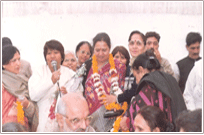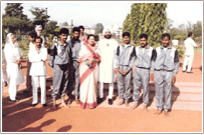|
 |
|
|
 |
|
|
| To make Delhi an environment friendly city. |
| To empower the women of Delhi by providing them with education and employment facilities. |
| To make Delhi a safe and secure city for women to live and work in by making the laws against atrocities towards them more stringent. |
| To establish free educational centres for the under privileged |
| To sensitize the police forces and the various law enforcing agencies |
|
|
 |
Corporate |
|
|
| Mrs Shastri began her political career with a promise of bringing about change. Her experience of the corporate world as a Senior Executive with the TATA STEEL Company (Corporate Office) added a new perspective to her ideals and efforts of serving the people and the under privileged in particular. Here she was primarily responsible for coordinating and implementing the activities of the Tata Steel Rural Development Society (TSRDS). The basic activities of the agency included assistance in drip irrigation, agriculture, safe drinking water, basic healthcare service, income generating activities, environment and forest protection, and women development programme in 32 villages in and around Jamshedpur (The number of villages now under TSRDS is 200). The most noteworthy involvement in this field includes the “Lifeline Express” or the “Hospital on Wheels”. |
|
|
|
|
| |
 |
 |
Family Welfare |
|
| Her work in TSRDS included a progression from immunization in isolation to an integrated approach towards mother and child health care. Projects such as child survival project laid stress on community awareness and empowerment. A total of about 95,000 children were immunized from deadly diseases and about 12,500 women were sterilized. Women were encouraged to attend annual laparoscopy camps in rural areas and the expenses were subsidized. |
|
|
| |
 |
Income generation Schemes |
|
| She has also worked with the Council for Advancement of People's Action and Rural
Technology (CAPART,). It is an agency under the M/o Rural Development which ensures right marketing techniques to be followed between the buyers and rural producers for appropriate returns. As part of her functions with the agency she has also interacted with the Confederation of Indian Industries, Department of Company Affairs and Department of Economic Affairs and other agencies. |
|
|
| |
 |
Water Conservation and Allied Schemes |
|
| As part of her work Mrs Shastri also helped establish a number of micro-water cooperatives around available water resources, optimally starting from the ‘Pani Panchayat’ at Pachardih, a village near Jamshedpur. Today about 21 such panchayats are running successfully. Some of the programmes that she was associated with were check dams, paddle pumps, pump sets and pond deepening exercises. |
|
|
| |
 |
Tribal Development |
|
| She has also coordinated the efforts and activities of the tribal and Harijan Welfare cell of Tata Steel. The focus of this cell is the socio-economic development of the tribal, the original inhabitants of Singhbhum. The Harijan, welfare activities were confined to the slum regions of Jamshedpurs urban areas and the key development issues identified for both these communities were education, health and medical activities, development of youth through sports and games, art and culture. The cell assesses the potential of the young tribal and Harijans and assists them to accelerate their development in their chosen field. One of the prominent initiatives in this regard includes creation of an experimental herbal |
|
 |
| garden. She has also worked as a coordinator for relief activities during natural calamities (earthquakes in Garhwal Hills, Latur and floods in Bihar) on behalf of Tata Steel. Apart from the activities and initiatives undertaken to do full justice to her role as a social citizen in a corporate environment, she has also handled media related public relation activities including organising press conferences, seminars and sport activities for the company. |
|
|
| |
|
| |
|

